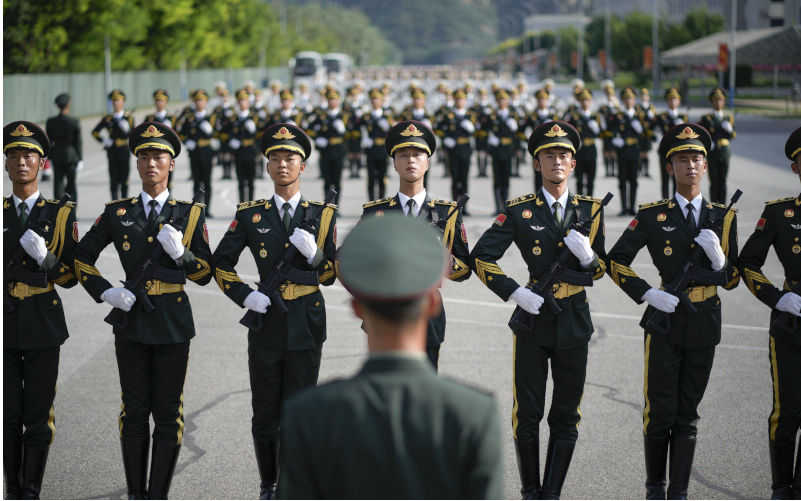Beijing invited me to their special celebration. Here's why I'm happy to go
September 3, 2025
When Australians at their Bakelite radios heard of China’s victory over Japan in 1945, they knew this was the triumph of an ally. World War II had started with the Rape of Nanjing in 1937 and the Chinese lost 20 million people resisting the invasion.
Australians also knew the link between these sacrifices and our own security. Chinese armies had kept a million Japanese troops tied down. According to historian John Hirst, this made it impossible for the Japanese navy in 1942 to win its case for an invasion of Australia. The Imperial Army could not spare the divisions.
With a father who had served in the Pacific and a mother who was in the army, along with an aunt and two uncles, I learnt as a kid about the Chinese theatre of the war. It’s why I accepted an invitation from the Chinese consul-general to attend the 80th celebration of their victory, travelling to Beijing at my own expense.
The Chinese experience touches Australian history. The horrors of the war, reported extensively in Australia, had led waterside workers in the Illawarra in 1938 to strike rather than load Japanese vessels with iron used to make bombs to drop on Chinese civilians. This was heroic when unemployment was at Depression levels.
When Winston Churchill tried to get Australian troops to Burma, it was to help keep supply routes open into China. Both he and Franklin Roosevelt were determined to keep China in the war. Chinese victory was a vital Allied war aim.
Right-wing commentators criticise me for going because Russian President Vladimir Putin will be in attendance. This comes from the same Trump-friendly media that found acceptable Donald Trump welcoming Putin onto American soil, even as Putin intensified his warfare against Ukraine. This was a diplomatic triumph beyond Kremlin fantasies.
Why would China exclude Putin from a celebration of the end of the war both countries had bled in more than any others?
When the Trump administration in 2017 decided to categorise China as an adversary instead of a competitor, it might have known it would be creating conditions for China-Russia rapport that, up to that time, had been unlikely, given their rivalry in Central Asia and their history of border tensions.
What attracts me to this celebration more than a glimpse of the Russian leader in the viewing stand is the attendance of big delegations from nine countries in Southeast Asia including Indonesia, Malaysia and Singapore. Each appears to have reached the pragmatic view that they can deal with China as a great power as they dealt over hundreds of years with Imperial China.
Attending with former prime ministers of New Zealand, Helen Clark and John Key, provides me another opportunity to share views about how we accommodate a reality none of us has the power to stop anyway: China’s emergence as a great power – and the need to avoid conflict between it and the US.
When I address two Chinese foreign policy think-tanks, I will remind them of the success of Prime Minister Anthony Albanese’s recent visit and the desire of Australians for a sound relationship based on national interests. Chinese diplomacy, I’ll say, can be more nimble. I’ll suggest in particular that the Trump administration has created opportunities for China – for example, to work at better relations with India and Japan. The latter will be represented at the celebrations by former prime minister Yukio Hatoyama, an advocate of Japanese-Chinese amity who apologised for Japanese war crimes.
I’ll suggest that China has gained nothing from assertive behaviour in its maritime territorial dispute with the Philippines, except to feed the arguments of its adversaries.
Of course, Chinese leadership will see a propaganda or public relations advantage from the celebration. I imagine Trump, America’s first post-democracy president, had the same notion when he commandeered Washington for a military parade celebrating the 250th anniversary of the founding of the US Army. We used to make announcements about the quickly fading AUKUS partnership with politicians standing next to Virginia class nuclear subs.
Great powers tend to boast military power, and it doesn’t look nice. The task of diplomacy is to keep the hardware in the parade and not on the battlefield.
Australians in 1945 would have seen China’s victory over Japan as a win for humanity and a triumph of a suffering people – especially the families of the returning PoWs and the men themselves. Worth commemorating? Yes, and using as a basis for talking about a future with no more such war.
Republished from The Sydney Morning Herald, 1 September 2025
The views expressed in this article may or may not reflect those of Pearls and Irritations.


